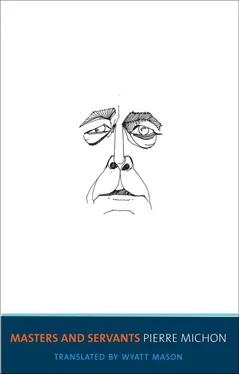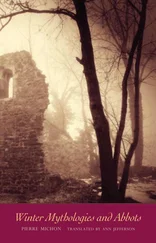HE QUICKLY WORSENED. He had no illusions about what was happening to him, this obstinate rejection of the air we breathe, this renunciation of air, this no said a hundred times over and as peremptory as the ecstatic yes of the women of the south wing, the no incarnate that lips no longer said but that a body shouted, a chest, with the burlesque nodding of a head that made one believe that the one who was coughing was saying yes , saying yes all the way to the grave: it would take a smarter man than I to say which air he was coughing up, which amongst all that he had breathed, the marvelous, poisoned air of his Flemish youth, the air that touch upon touch blued the summers of his paintings, the air that with a single touch from above blued the ponds in morning, in summer, the blonde wind of gardens maundering around necks, chignons, sudden gusts of wind on our cheeks when you lift up a dress deep in a wood, the time it takes, the time he had taken all the days of his life, in all the paintings of his life, which was another time altogether; the glorious air in Paris when you discover that beneath its skies Gersaint is using one of your paintings as a sign; the triumphant air in the courts; the heavy air in the garrets; the stinking air in London where they tell you that your illness is called consumption, that is what you are coughing up, when you suspect that it’s actually called painting, or the world, or women. Smarter than I, whoever could have made out which it was, the world or painting, that he was coughing up, or perhaps their unbreathable mix; whether it was hellebore and borage that his lungs were driving out, or the Veronese greens; or all of it on top of the rest of it, the recollected air of everywhere and everything painted. But I can’t say; I’m not a doctor, thank God.
He didn’t leave the blue salon. You needn’t much space in which to die. There, the second Sunday of July, toward noon, he asked me to destroy the canvases in the south wing, as he was too weak to do it himself. I didn’t want to; since I had been going to see him, I had become intimidated by all the labor in his art; I saw them as exhausted, delicate, more fragile than living things. So I refused; the anger I expected didn’t come. He told me in a tone of great fatigue that his fame had to remain well bred, even if he hadn’t remained so himself; that what had been the published backside of his unknown work — the little minuet, the oboe, courtship, and dresses— had turned out not to be the backside, but the front, as far as everyone was concerned, perhaps even as far as he was concerned; and that the fronts, the originals, his wicked and ecstatic paintings on the backs of which all the rest had been painted — thrown like dresses over haunches or verbs onto tongues — no longer existed and didn’t deserve to survive any more than the cries of newborns or of the dying, the mysteries of midwives and of punchinelli: that perhaps it was little more than that, painting, a game of dress up. And only this game deserved to endure. He bequeathed his little chamber musics; it didn’t matter much to him whether or not we heard the echo of the fugues he had played only for himself: whether he had played poorly or too well was of as little interest to him as was the incorporeal Being who stirs our paintings and perhaps accepts them, who looks at them, who amidst his choruses still reserves an ear for our music, who knows that flesh is too much for us, isn’t enough for us. To angels his harlots, to man his marquises: he wouldn’t visit this terrain again. He said again, and the anger was building in him, that he wanted to have them one last time, in fiery deliverance.
I burned them.
It took all the middle of the day. The little valet helped me, brought them to me one by one, departed; I don’t know if he had already seen them, but he looked at them as long ago he had no doubt looked from the pantry at the dinner tables, a myriad of candles and truffles, teals, champagnes of white gold. I lit a great fire on the warm stones of the terrace, near the lindens, in front of the blue salon, and into this fire they disappeared. After three the sun reached the terrace, and they rose in this light. They crackled; there were no flames to see, there were no sparks, in the white air the sun burned brighter; it wasn’t much of a sight; it was just a little earthly sacrifice in a frivolous palace, nothing momentous, just a midden of unwearable old clothes in which a tired old fellow, an abbot or a peasant, all blackened and bent beneath enormous bright lindens, poked at ashes all alone as it burned until nightfall.
Perhaps he — sleeping in an armchair behind the open window in the shadows, wearing a tie for the ceremony, a wig, white gloves, and red velour hat, all decked out and as ghostly as ever, disgusted and gaunt, far from his home if he had one — perhaps he saw it differently: surely not what he might have wanted one to believe he’d see there, some flaming harem of theatrical agony, the shadow puppet of a king with a big nose; perhaps he saw the Assumptions he never painted, perhaps in chrome yellow and azure; a celestial assembly of fields, a little fire, two men, no living women; certainly he saw cousins he’d caressed during a childhood in Valenciennes; or perhaps just what was there to be seen, what he had always seen, preserved at least once, at least in the sign he painted once for Gersaint: unknown men taking paintings off a wall, stuffing them into dry wooden crates next to tinder about to be struck, entombing them, and some dubious old fellow scrutinizing the painted flesh one last time before the window closed, the Marquise to end all marquises already leaning on his shoulder, holding her lorgnette like a scythe. Watteau leaned closer on a few occasions to see what was burning, lifting himself halfway to the window, his red outfit, his wig, blazing in the sun; then disappeared back into the shadows, dumbfounded. He said: that foreshortening is worthless; he said: no one would want those; and he said: that Pierrot doesnt matter; and later, in a strong voice, a neutral cry: Marie-Louise Gersaint . The old disgust beat on his lips. He coughed at length, covering his mouth with his tie.
At the end of the day, the little girls returned to sing in the meadow; the last frames burned on the embers; perhaps they saw this exhausted old man, living chez Le Fevre, who was burning litter or old clothes. They didn’t see the king with a big nose, his red clothes in the shadows. They were holding each other’s hands; they passed from shadow into light and their dresses were changing; their song in the lindens seemed as heartbreaking as the smoke of a work that was burning down; I thought about my youth, about the uniform I wore, opportunities I had missed. I watched them for a long time. The little valet took me by the hand, showed me the window, laughing: he had fallen asleep like a good little boy, his nose in his tie, cradled by these songs after the carnage, like a warrior, like a child.
Let us go to Cythera
on pilgrimage, I presume .
Young girls rarely return, O no ,
without a lover or a groom .
He died on the eighteenth. Early in the morning a storm gathered. Nothing stirred, stilled trees in a white sky. The storm didn’t burst, nothing came. In the interim, he wandered: he said that he had never painted bad weather; he said that his painting was gay; he affirmed that he too had been gay, at great pains propped himself up on his elbows, begging me to agree with him. Yes, I told him, he had had nothing but joy, pleasure. The storm took its time; he wanted a crucifix; I offered him mine, which is cheaply made but artful enough for the good people here, for their final glance; I prayed; he made a sound like a laugh, the crucifix fell: “Take it away,” he said. “Can one have so poorly served one’s master?” Then: “Your face is enough for me.” This last bit of coquetry moved me more than I am able to say. There were a few thunderclaps, no wind; stone trees began to lean toward Monseigneur le Peintre like taciturn monseigneurs; a flash of lightning carried off the scandalized little rogue, in the falling afternoon, at the hour when dresses begin to assemble on the terraces that the fountains besiege, the innumerable leaves.
Читать дальше












